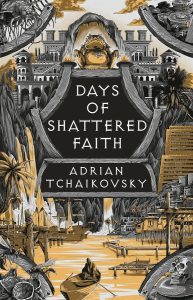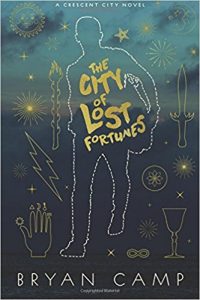Days of Shattered Faith by Adrian Tchaikovsky: Review by Russell Letson
 Days of Shattered Faith, Adrian Tchaikovsky (Head of Zeus 978-1-03590-152-4, £22.00, 544pp, hc) December 2024. Cover by Joe Wilson.
Days of Shattered Faith, Adrian Tchaikovsky (Head of Zeus 978-1-03590-152-4, £22.00, 544pp, hc) December 2024. Cover by Joe Wilson.
Days of Shattered Faith, the third book in Adrian Tchaikovsky’s Tyrant Philosophers sequence, continues to examine the effects of the long-running, world-conquering program of the nation of Pallesand, a resolutely rationalist, religion-detesting nation determined to bring its notion of secular perfection to a world that is filled with supernatural forces and entities of all kinds: gods, ghosts, demons, and magical powers and practitioners. The first two books, City of Last Chances and House of Open Wounds, were set in, respectively, a defeated and occupied city and a mobile field hospital and offered views of Palleseen bureaucratic and military cultures and authority pyramids, as well as of the metaphysics of this magic-saturated universe. Days of Shattered Faith turns to international diplomacy and its sometimes-unsavory means and methods. The setting is Alkhalend, the capital city of Usmai, the most powerful state of the ‘‘Successor Coast’’ culture that is high on Pallesand’s to-be-perfected list. Usmai is ancient and still independent, resilient, and strong, thanks in part to its willingness to absorb, adapt, and tolerate populations from outside cultures (or even outside universes). Which means that Pallesand’s efforts to bring Usmai into its hegemony – – its Sway – must proceed via diplomacy and influence-building rather than direct military confrontation – for the moment, at least.
Much of the central plotline follows the efforts of Gil Angilly, Pallesand’s Resident (chief diplomat and dirty-tricks operative) in Usmai, to manage this project. Of course, her work sets off all manner of complications and upsets many applecarts, personal and political, each of which generates a new subplot with its own viewpoint character. To begin with, Gil is honor-bound to fight a duel with her opposite number from the Loruthi diplomatic service, which she finds painful because he was not only a rival but a friend who has had the bad fortune to be on the losing side in one of Pallesand’s endless wars for dominance. That same day, Gil also finds herself saddled with an unexpected, inexperienced, and unasked-for new assistant, Loret, who has a murky background and no discernable diplomatic, covert-ops, or other skills, beyond an unpredictable capacity for extreme and ferocious violence. But then, Gil’s situation is already full of strains and conflicted feelings.
Working in Pallesand’s diplomatic service wasn’t a job for an ideologue. You had to make too many compromises… . All those traditions and gods, the festivals, the monks, the idiosyncrasies, the language, the stories, all of it done away with because they got in the way of efficient perfection. And she’d been off the leash and in foreign parts for long enough that she’d become fond of those things herself. She could see why you’d miss them.
The governing powers of Usmai have their own problems. The Alkhand (hereditary monarch) Operan is in decline, and his eldest son, the ‘‘warrior prince’’ Gorbudan, has been exiled and disinherited. This leaves the mild, reflective second son Dekamran as the designated heir to the throne. While Gorbudan aches to take military action against the Palleseen, Dekamram looks for a diplomatic solution with the help of its Resident, Gil, ‘‘[w]ho is, in fact, his closest friend, and a woman he greatly likes and admires.’’ Actually, more than ‘‘likes.’’ To make things more complicated, Gil feels the same way about the prince. What could possibly go wrong?
Elsewhere there are: a pirate band/tribe with an unexplained interest in Loret; two variously discontented younger siblings of the royal family; the wardens of a ghost-filled, escape-proof prison called the House of Hard Angles; the masked monks overseeing the Waygrove, an entry point to and from other worlds; and a half-dozen refugees from the climactic events of House of Open Wounds, a ‘‘crooked little family’’ that has set up the Fever Lodge, a slum-based clinic where they practice the material and magical healing arts. The Fever Lodge dwellers do not seem to be at the center of events, but they eventually take crucial actions. Then there are what might be called the semifree agents, whose personal ambitions might require some finessing of their (already loosely defined) official duties: a sketchy but competent Palleseen ‘‘Ventures’’ military officer and a roving Decanter (a relentless hunter/drainer of magical objects). There are even some demons whose contractual bindings have been manipulated so that they form rather undemonic connections with the upper world.
The novel’s title points to its main emotional line: faith lost, questioned, suppressed, betrayed, or transferred. And it’s not only religious faith or supernatural belief at stake. Also challenged and strained are personal or familial or cultural loyalty; chains of command, protocols, traditions, and rulesets; moral codes; or even what might have been thought to be one’s own nature. Some of those betrayals and desertions point to freedom – or maybe just a different set of constraints and compromises and conflicting demands. And some of those conflicts are not resolvable.
This makes for a complicated, interwoven, multiviewpoint plot dotted with many back-story reveals, rich in intra- and interpersonal conflicts and fraught relationships. The overarching story of succession via usurpation and fratricidal civil war invites comparisons to both A Game of Thrones and the Wars of the Roses, while Pallesand’s geopolitical machinations and ideological rigidity carry a strong whiff of the Cold War. So there are assignations and assassinations, imprisonments and escapes, and several very large set-piece battle scenes featuring frightful otherworldly creatures and forces and a great deal of scenery-destroying. But there are also strains of difficult or forbidden erotic attachments, restless nondynastic ambition, youthful defiance, professional disillusionment, bitter exile, lost love, and undercurrents that reach far back in time. The several resolutions are severely circumscribed, with relationships and affiliations and loyalties rearranged, not always in comfortable or comforting ways. But in the hard world of the Tyrant Philosophers, such bloody flux is the best outcome one can hope for.
Russell Letson, Contributing Editor, is a not-quite-retired freelance writer living in St. Cloud MN. He has been loitering around the SF world since childhood and been writing about it since his long-ago grad school days. In between, he published a good bit of business-technology and music journalism. He is still working on a book about Hawaiian slack key guitar.
This review and more like it in the December 2024 issue of Locus.
 While you are here, please take a moment to support Locus with a one-time or recurring donation. We rely on reader donations to keep the magazine and site going, and would like to keep the site paywall free, but WE NEED YOUR FINANCIAL SUPPORT to continue quality coverage of the science fiction and fantasy field.
While you are here, please take a moment to support Locus with a one-time or recurring donation. We rely on reader donations to keep the magazine and site going, and would like to keep the site paywall free, but WE NEED YOUR FINANCIAL SUPPORT to continue quality coverage of the science fiction and fantasy field.
©Locus Magazine. Copyrighted material may not be republished without permission of LSFF.








